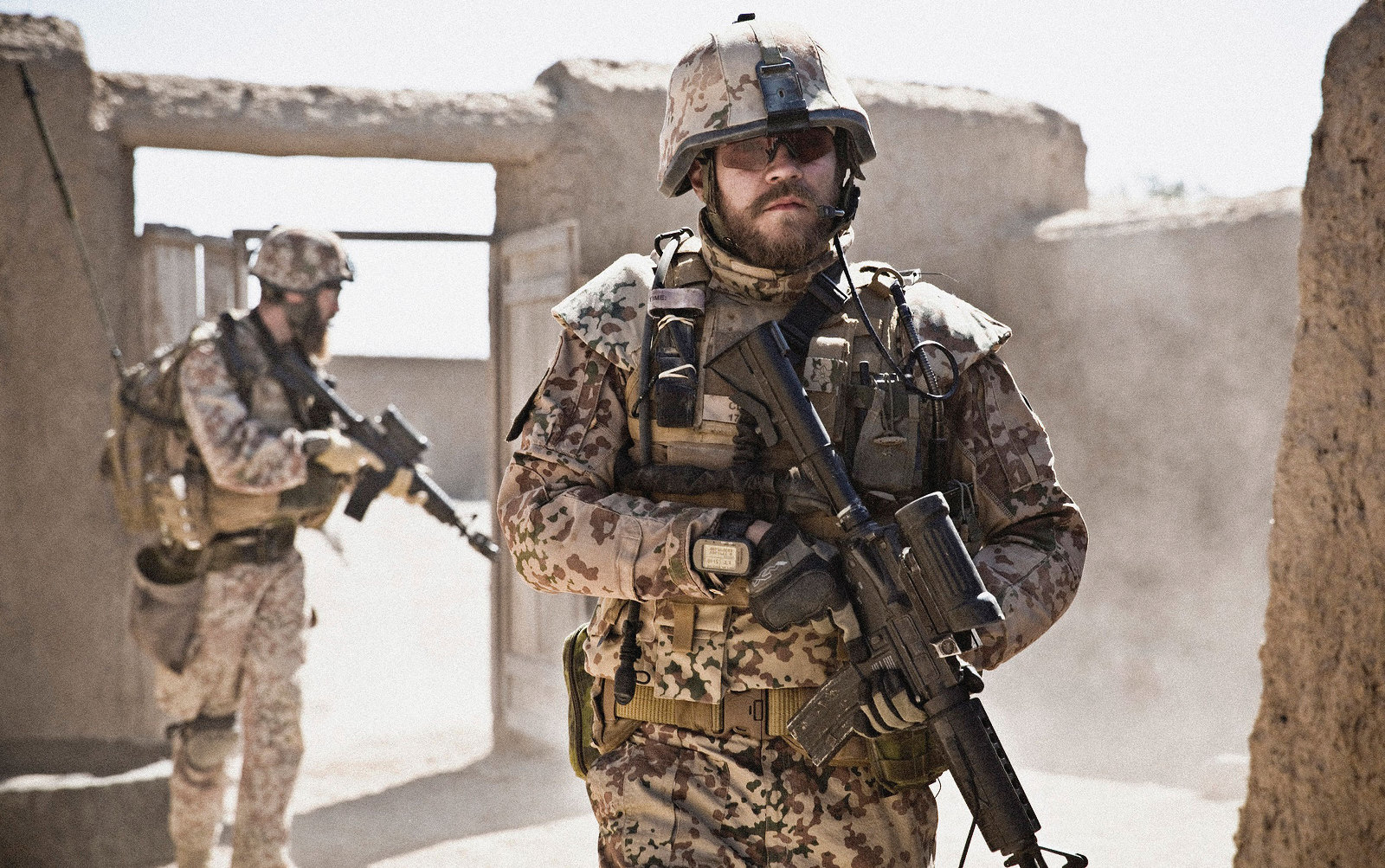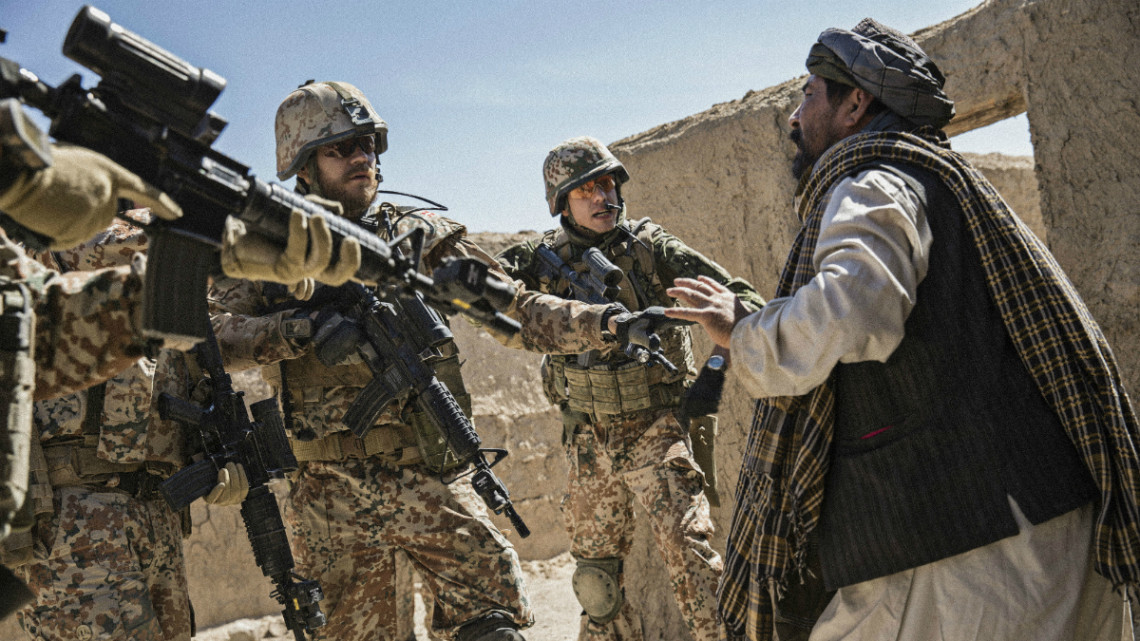If Denmark’s modern film scene is finally getting strong international recognition, Tobias Lindholm is a significant reason why. The writer/director has enjoyed worldwide success in recent years, writing the screenplay for Thomas Vinterberg’s brilliant The Hunt the same year his directorial debut, A Hijacking, earned tremendous critical praise back in 2012. In keeping with the roots of the Danish-born Dogme movement of the mid-‘90s, started by Vinterberg and Lars von Trier, Lindholm’s style embraces gritty realism, natural lighting, and emotional honesty, all of which are in full display in his latest film, A War. The film stars his charismatic Hijacking lead Pilou Asbæk as a Danish CO in Afghanistan, trying to keep his troops safe and his family back home together, until a wartime scandal erupts after one of his commands leads to civilian deaths.
Lindholm spoke with Movie Mezzanine over the phone, as he was traveling through New York in the back of a limo, occasionally interrupting himself to warn us about oncoming tunnels and other cell phone signal impediments.

MOVIE MEZZANINE
I have to tell you that two of my favorite films of 2012 were A Hijacking and The Hunt.
TOBIAS LINDHOLM
Well, thank you very much. You make me very proud.
MOVIE MEZZANINE
An element inherent in those two and A War is the Dogme-like filmmaking aspect, in the way it tamps down any sort of melodrama. Why does that particular style appeal to you?
TOBIAS LINDHOLM
You can say that I hate melodrama in my own life. I try to avoid scenes with my wife, where we cry, yell at each other, go all crazy, and I have to say I don’t enjoy it in movies either. I find it dishonest, and a bit too much. And also, for me, it seems that [melodrama] references other films instead of referencing reality. I definitely try to write stories where my reference is reality, the world that I live in, instead of the world that I pretend to live in. There is a huge difference.
MOVIE MEZZANINE
There has to be a tremendous distinction between writing a screenplay that you are intending to direct and writing a screenplay for someone else to direct.
TOBIAS LINDHOLM
Definitely. My work with Thomas [Vinterberg], for example, is to do the best possible screenplay for him. So I am very, very eager and disciplined to make sure that screenplay is perfect as a piece of work, to use it like a blueprint for the film crew, for everybody to understand. I want to make sure that it’s extremely precise. Writing a film for me, I’m a bit more sloppy. I know that I will have control over the material anyway when we are shooting, which means that I allow myself to be more relaxed about making sure that every point is on the page. And in that way, for me, the material, when I’m writing it, both for A Hijacking and A War, has been more open. I’m having conversations with the actors. I’m there to make the changes. I’m not there to make the changes for Thomas when he’s out doing a film. So you could say that I’m a bit more sloppy and lazy when I’m writing for me; I’m trying to be very slow and precise when writing for other directors.
MOVIE MEZZANINE
One common thread lies within a lot of your work: You write films that you put the audience in this strange position of seeing both sides of a given ethical equation. So, on the one hand, in A War, it’s very difficult not to root for someone as kind and thoughtful as the CO, Claus, seems to be, but because we saw him make a bad, split-second decision, where innocent people died as a result, we also know the other side. We don’t want him to go to jail, but he probably should. Your work creates this kind of tension, between the characters, but also very much in our own heads, between what we want to have happen versus what’s should happen.
TOBIAS LINDHOLM
I’m a product of the ’80s. I don’t believe in a simple world. I believe in an extremely complex and nuanced world. I grew up with a fantastic mom, but she’s a really classic Scandinavian socialist. She believes that rich people have stolen their money from poor people. At the age around 12, I realized that wasn’t the whole picture. One of my friends’ fathers had his own company, and he was successful, they had a lot of money. Now, if I had to go to think like my mom taught me, I would look at him as one of the bad guys, right? But at the same time, he would take me to Sweden with my friends and go fishing, and have fun for the weekend, and I couldn’t see that he was a bad guy at all. I thought he was pretty cool and nice.
So I confronted that idea, basically, when I started to write this film, I decided to aim for one thing: I wanted my good, wonderful socialist Scandinavian mother to feel sympathy for a war crime. If I could do that, I knew I was getting nuanced and complex enough. I think that it is very important that we start looking at each other as individuals, and that we are not trying to define our world in 140 characters on Twitter or on updates on Facebook, or Instagram, or Snapchat. Everybody looks like they are extremely happy on Instagram, right? And everybody knows that everybody is miserable most of the time. The honesty and the complexity of that is lost in the idea of something good, something bad. And I have to say with all the research that I’ve done for [my films], the same idea is true: You can always find good, human reasons for most actions. Not for you to defend them. Not that they are not wrong. But at least you can understand them, and accept the complexity of them.

MOVIE MEZZANINE
Well, particularly, when you make such a point to show your protagonist as a exceptionally kind and thoughtful man, who worries about families in Afghanistan and who really cares deeply about the men under his charge. I think that creates this atmosphere where, as an audience, we want to pull for him and his loving family. And yet, there is this horrible thing that happens where he has to admit culpability.
TOBIAS LINDHOLM
Totally. And I think that the prosecutor, played wonderfully by Charlotte Munck, is totally right when she says, “Even though we understand why he did so, even though we understand that he was under a huge amount of pressure, we cannot accept it. If we do, we become somebody we don’t want to be.” She’s right. Seeing it from above, she’s right, but you see this guy with a wife and having an emotional relationship with his kids. I don’t want their father to go away. I want the child to have a childhood. And that complexity is exactly what I’m looking for. The idea that the world is not a place where things are always right or wrong. As we say in Denmark, “Every time you step out into the sun, you will throw shade somewhere.” Every action you do has consequences. We want to talk about people either being good or bad. And I just don’t see the world like that, and I love to bring those nuances into the theater.
MOVIE MEZZANINE
So, at this point it’s safe to say, in the way you’ve deployed him in your films, Pilou Asbæk is one of your personal muses. You also have Søren Malling and a couple of other actors that you’ve used from A Hijacking in this film. Are you writing your script with these specific actors in mind?
TOBIAS LINDHOLM
When I got the idea for the film, I called Pilou immediately and said, “Can you film two years from now?” And he said yes. So I knew that I was writing for him. For me, I’ve known it for a long time, but for me, he’s the best European actor of his generation. And I’m afraid the world is now seeing that as well, so I’m losing him. So I guess I’m the only person in the world who’s cheering for him to get killed in “Game of Thrones” so he can come back home. He has a great amount of honesty in what he does, and that’s very rare. He never pretends. Sometimes it can be hard to watch him work, because he goes all the way. Sometimes I have to call his wife and say, “I’m sorry”, while were shooting because I’m sending home a guy who’s broken, who’s given all and has nothing more to give. But that’s the kind of guy he is.
MOVIE MEZZANINE
He has this really genuine quality that you cannot help but feel sympathetic towards, which seems to be essential in the way that you operate with your narratives.
TOBIAS LINDHOLM
We talk a lot about that. The beauty about Pilou is I always end up removing, let’s say, 10-15 pages from the script because his eyes tell it all. So I don’t need them. Just by being there, he delivers that information. And that quality, connecting with him on a human level, is a tool that we discovered in A Hijacking that we have tried to use more controlled in A War: Just looking at this guy, we kind of like him, no matter what he does. That’s a special gift. We’ve been working together for 10 years now, so we kind of have gotten to get to know each other. We don’t need to speak that much on set. I’ll give him a look, and he’ll give me a look and then we both know what we’re going to do in the next take.
MOVIE MEZZANINE
I will say, as an American, it’s very interesting to watch a war film set in Afghanistan from another country’s perspective. You can’t help but feel that some of the country’s feelings about a particular war, and the necessity of that war, are kind of reflected in the films they make. Are there elements in the film that you would say did actually reflect the Danish response to Afghanistan? The moral question that’s at the heart of the film seems to me like that’s the moral question that’s in every war movie ever made.
TOBIAS LINDHOLM
Yeah. I feel like the ending, the final frame with [the CO] sitting alone, is the exact situation that Denmark is in right now, as a nation. We are sitting back here now trying to figure out what to do with what happened out there. We are, as a society, in a post-Vietnam phase. I don’t think we are doing enough to talk about it, not that you are for or against the war, but just as an experience to learn from. I knew when I started to do this film that I didn’t have a certain political point of view about this war. I’m pretty sure that my point of view would be: Let’s talk about it. Let’s face it. Let’s not be ashamed. Let’s not look away. Let’s not pretend it wasn’t there. Let’s look at this and turn every stone until we’re done with it. There are so many people, so many families that got torn apart by a political decision about going to war, and I think these human beings are more important than simple politics.

















